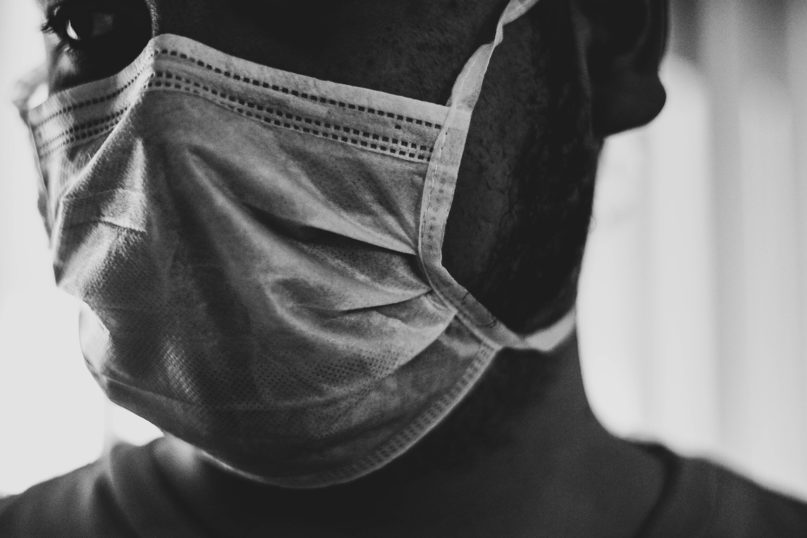(RNS) — It was only a matter of time before masks became a battleground of the culture wars. Once upon a time in late May, Doug Burgum, governor of North Dakota, pleaded with his constituents not to make wearing a mask out-of-doors a political thing. “I would really love to see in North Dakota that we could just skip this thing that other parts of the nation are going through, where they’re creating a divide — either it’s ideological or political or something — around mask versus no mask.”
Four days later, Jerry Falwell Jr., president of Liberty University in Virginia and an ardent Trump supporter, tweeted that he would comply with his state’s mandate only if his mask bore an image, which had caused a scandal last year, of Falwell’s governor, Democrat Ralph Northam, in blackface as a young medical student.
By late June, 63% of Democrats and Democratic-leaning independents said masks should regularly be worn, compared with just 29% of their Republican side counterparts, according to Pew Research Center.
There are many factors that seem to go into the decision to wear a mask: trust in government, the risk an individual feels from the coronavirus, how much we feel our actions can control the disease at all.
But central to the politicization of mask wearing seems to be the issue of masculinity. Men are much less prone to don a mask, Pew’s data showed, and opponents of mask-wearing largely code their decision in terms of bravery and risk-taking and, by implication, brand mask wearers as effete, or cowards. A study from Middlesex University in the United Kingdom found that men were significantly less likely than women to wear masks, in part because they thought it was a sign of weakness or femininity.
Some of the most robust arguments against masks have also come from some of the political and religious right’s paragons of performative masculinity. About the time the Middlesex University study appeared, Rusty Reno, editor of the conservative journal First Things, tweeted “Masks = enforced cowardice.” It was a mindset he’d already laid out in a May 12 “Coronavirus Diary” on the First Things website, in which he boasted of going unmasked while on a weekend cycling jaunt.
“Providentially,” he wrote, “I found a mask in a gutter just before reaching the Staten Island Ferry, allowing me to board and steam back to Manhattan.”
Reno later tested positive on an antibody test, making it possible that he had been unwittingly spreading the coronavirus; he has since deleted his tweets and issued a brief apology for “over-heated rhetoric and false analogies.”
Reno has long made a personal brand out of an atavistic pursuit of primal strength — quite literally: Reno’s latest book is called, “Return of the Strong Gods.” Mask-wearing — like meat-eating, weightlifting and other shibboleths of masculinity — has entered into the discourse of a kind of nominally Christian traditionalism that opposes neoliberal modernity as the agent of the “sissification” of civilization.
Often coded as inextricable from urbanization and multiculturalism, neoliberal modernity embraces nontraditional gender roles, female equality and LGBTQ people. In answer, Reno’s brand of Christian traditionalism deploys a kind of cultural hand grenade — blowing things up real good — often for the purpose of “owning the libs” or beating “the system,” but as often to deconstruct that system to reveal purportedly primal human values beneath: Reno bemoans our mask-minded culture that, on the same quarantining impulse, allows our elderly to die of COVID-19 alone.
This is why the traditionalist indulges in acts that manage to be individualistic and transgressive at once. Putting the lives of other people at risk is — in this mindset — “dangerous,” “sexy” and all the more authentic for opposing the advice of sclerotic or faceless institutions (such as, say, the coronavirus guidance of the CDC).
But the traditionalism of Reno is a thoroughly unsatisfactory salvo against modernity. As a critique of our culture, it doesn’t afford any avenue to revolution or change, offering instead what looks on the surface like an inward-looking nihilism. (In fact, Reno is a Catholic who sneaks off to an undisclosed church, he confesses in his First Things post, to be “cared for” by a priest who leaves the doors unlocked as he celebrates the Eucharist.)
It’s also a distinctively modern form of traditionalism. Its “nostalgia” for a time when gender was binary and politics were incorrect is not just an affect, but an element of a personal brand, a stake in the digital marketplace.
So while Reno and his ilk use the refusal to wear masks as a shibboleth for those who aestheticize rugged individualism, or pious authenticity, their death worship is disguised as bravery. That, for all its claims to reject and overthrow the Modern Age, is thoroughly and completely of its time.






